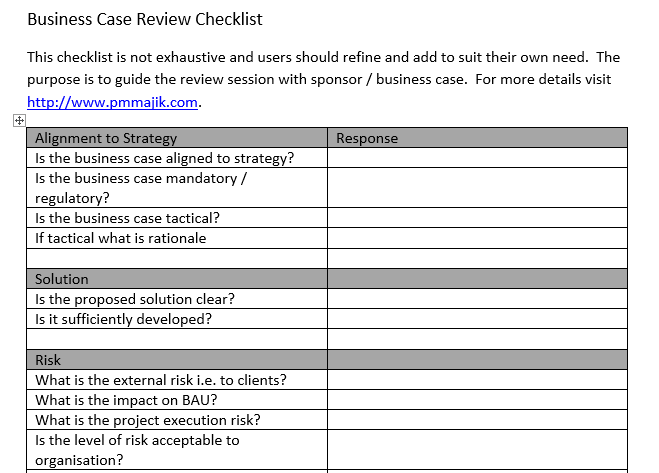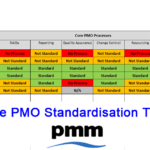For any project to have a chance for success, it is important to start with a solid foundation. A key part of this is to have a robust business case that has been agreed, and signed off by the sponsor(s). For more information on why this is important view post 5 reasons why a project should have a business case (you may also want to take a look at the post Why sponsors do not want their project to have a business case).
The reason for the business case is to ensure that the project has been though through and a credible case developed that makes sense. This means the business case should have a good idea what will be done, the cost, the benefits and if it can be achieved.
A PMO can play a valuable role in helping to ensure that the business case is robust by performing reviews ahead of any formal review and sign-off. This is a worthwhile exercise as it helps improve the quality of the case.
The project manager should view this as a positive as opposed to a hindrance as it is far better to catch potential issues in a less formal review so that changes can be made to give the case a better chance of approval.
This review can be greatly assisted by using a checklist. This will help to ensure that important areas are considered. While not an exhaustive list, areas for consideration include:
Alignment to strategy
Resource, time and budget are typically scarce. Therefore, they should only be invested on business cases that help move an organisation in the required direction.
Solution
There must be confidence that the solution has been considered and that it can be clearly explained.
Risk
Very important. How much risk is in the solution? A business case with a high payback but very high risk may not be delivered. Understanding the risk is an important part of the decision.
Buy-in
It does not matter how compelling and good the business case is, without “buy-in” the project is destined to failure.
Resources
Projects are delivered by people. So a check must be made that resources will be made available and that they have the required skills.
Budget
A project will need investment. The budget must be agreed and allocated if the project is to deliver to agreed timelines. Slow budget approval can seriously damage progression.
Return on Investment (benefits)
Most business cases, unless they are mandatory / regulatory type changes, should have some form of benefits. These must be clearly defined to allow a considered investment decision.
Technology
Most projects involve some form of technology change. It is important to understand what technology will be used, if it is new or established, hardware requirements, etc. New untested technology can be very high risk.
Summary
The above checklist gives some ideas on areas of the business case that should be tested. This is not an exhaustive list and you should add other areas applicable to your organisation. The aim is to conduct a thorough review to help improve the business case.
Free PMO / Project Business Case Review Checklist
You can download a free checklist template that you can update and use. It does contain a number of questions you may wish to ask against each of the headings listed above.
 If you find it useful please can you share your appreciation by using the social media links on this page.
If you find it useful please can you share your appreciation by using the social media links on this page.







